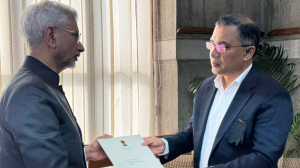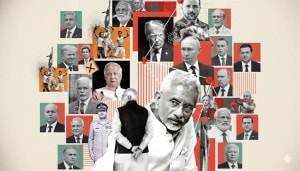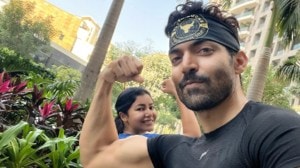To Catch A Killer
Judge Aguiar's findings will distress most policemen and even a sizable portion of the populace. In fact, it would not be surprising if p...

Judge Aguiar8217;s findings will distress most policemen and even a sizable portion of the populace. In fact, it would not be surprising if public opinion tilts in favour of the police in this instance, since nobody likes gangsters. If an index of the most unpopular segments of society is prepared, gangsters will get a higher rating than policemen.
Sada Pawle and Vijay Tandel were big-time gangsters specialising in extortions. Javed Fawda alias Abu Sayama was not so notorious, though he too had displayed criminal tendencies. If they had been shot dead by the police in an open confrontation, nobody could have taken serious objection, except human rights activists who demand strict adherence to the letter and spirit of the law. These activists want the culprits to be apprehended even when the police run a serious risk of being killed. Pawle and Tandel would not hesitate to shoot the policemen trying to catch them.
Judge Aguiar8217;s findings, however, are that the slain gangsters were probably in the custody of thepolice before they were killed. If that is proved in a trial in court, it will be difficult for authorities to defend the officers involved. Their acts would amount to cold-blooded murder which cannot be condoned.
What Judge Aguiar has not done, because that was not his mandate, was to tell the police and the public at large how the guardians of law can fight with one of their hands tied behind their backs. Over the past 20 years, the judicial system, like most public institutions in our country, has registered a steep downslide. It has become easy for gangsters, murderers and rapists to operate with impunity. Bail is easily obtained on the judicial percept that people should not remain in custody for long periods without being convicted. Besides, much valuable time of trial courts is wasted by unscrupulous lawyers seeking and obtaining adjournments. Since even the most heinous of crimes take years to come up for hearing in the law courts and the process of appeal and revision takes even longer, thecriminals are out on bail almost overnight. In terrorist-affected states, TADA was installed to correct this imbalance. This special law ensured that terrorists were kept in custody to prevent them from renewing their depredations. Unfortunately, due to an unprincipled misuse of TADA provisions in some states, particularly in Gujarat, there was an outcry from the minorities. This prompted the government to repeal the law itself instead of putting into place appropriate corrections.
The United States often cites human rights abuses to punish non-conforming countries. But a law very similar to our TADA has been enforced very successfully in American cities for the past decade. This law, which targets organised crime and racketeers, has brought down murders and other heinous offences in New York and other big cities. It is unfortunate that our own rulers succumbed to emotional and political pressures prior to the general elections and repealed TADA. It was to be expected that the repeal of the law would promptbeleaguered police forces to adopt desperate measures.
False encounters was one such desperate remedy. The police are under constant pressure of public opinion to counter rising crime. They are also subjected to political pressures of the party in power to arrest gangland crime as it reflects poorly on those who govern. Since the judicial system is of no help in the prevailing circumstances, even conscientious police officers condone short cuts like encounters. Unscrupulous officers, on the other hand, resort to such measures as a matter of policy. It assures instant recognition from their political masters.
The danger lies in the fact that there are some police officers, themselves with criminal inclinations, who will not hesitate to use the gun to eliminate not only notorious thugs but also smaller culprits. Very soon they graduate to killing one group of criminals at the behest of another group for a consideration. In time, they could consider killing people involved in civil disputes, again for aprice.There are cogent reasons for restraining such swash-bucklers from going on the rampage. The probability of corrupt officials emulating gangsters whom they are pitted against is not at all remote. The public should be worried of the danger in facing gangsters in uniform. If criminals are shot on the streets or in houses where they have taken refuge in full view of the public, the action can be justified because of its obvious transparency. Such encounters would involve different officers from different police stations at different times. However, when the same officers are involved in a series of encounters, there is enough room for suspicion. If, besides, the stories put out by them follow a pattern, the scope for questioning their sources and their motives definitely widens.
The gunning down of gangsters should never be proclaimed as a plank of government policy. This has been done in Maharashtra and Uttar Pradesh recently with ministers making statements, rather rashly, to that effect. Theconsequences can be dangerous. It is pertinent for government leaders to understand that a licence to kill can boomerang on authorities. Besides, they should know the vacuum left by deaths of such gangsters will be quickly filled by other candidates eager to make an easy, albeit dangerous, living.
The physical elimination of gangsters cannot decimate the underworld. What is urgently needed is a public debate on the state of the judicial process system. The authority of law must be restored. Every offender should know he will be punished and his punishment would be swift and certain. Every component of the judicial process system has a responsibility to bring about this change. If this cardinal truth is ignored, there will be no relief from blows now being showered on the public. Gangsters have become so bold, they extort money even from the most law abiding of citizens. If extortionists, kidnappers and murderers are not quickly tried and punished, all respect for law will vanish. As present, policeofficers think it useless to catch offenders and collect proof for their trial in courts. They use their revolvers instead, because the ultimate responsibility of maintaining some type of order on the streets lies squarely on their shoulders.
- 01
- 02
- 03
- 04
- 05































